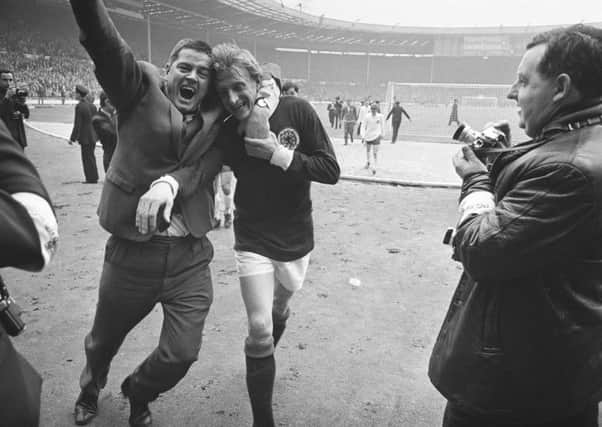New play keeps-up memories of Baxter, Wembley and 1967


One of the lesser-sung heroes of the 3-2 win that marked the first defeat of England since they had claimed the World Cup at the same ground the previous summer was Eddie McCreadie. Or was it? Orr would say. The Chelsea defender bore a striking resemblance to The Monkees’ Micky Dolenz, the UK’s top chart act that year. A year after there was all sorts of palaver about Paul McCartney having died and been replaced by a look-alike in The Beatles. The diving board that Orr uses to jump off with his less-than-serious theory; it might say something about his off-beam humour.
“The loves of my life are football, word and comedy and when I got into writing about five years ago I looked to combine these,” he said. As a man whose first Scotland game was Baxter’s last for his country in November 1967, he alighted on the Wembley game after writing several sitcoms, one of which came close to development.
Advertisement
Hide AdAdvertisement
Hide Ad“I never have any expectations because I know how difficult this business is for a writer but I derive great pleasure from the writing process. And once you have written, then of course you want to see your piece of work realised.”
Orr agrees that football is desperately poorly served by art despite the game being the cultural touchstone of our society. He wrote a light-hearted documentary about Wembley ’67 with comedy writer and Only An Excuse creator Phil Differ but after this was not picked up – “companies were all more interested in another football event at Wembley the year before,” – he turned his attention to a screenplay, then a stage production, which he has now been adapted to be a one-hander he hopes will be performed before the end of the year. The fact Scotland are playing England in June gives him an extension on the time frame, which this 50th year could encompass.
“Phil believes it is funny and everyone that I have shown it to has given good feedback,” Orr said. “I just think there is such a richness in the football and the societal and cultural changes then on-going, that is ripe for presenting in a literary form.”
The play now involves a supporter who was there on the day reflecting back from now on what that experience was like. Orr became so keen to immerse himself in that challenge he spoke to the fan, Peter Dallas, who is pictured with his arm round Denis Law in that “iconic image”, as Orr calls it. It turns out that Dallas had played for Third Lanark and had a fascinating story all of his own. Orr soaks up such human interest, and the tale of Scotland’s failure to reach the European Championship after beating England is the stuff of Greek tragedy.
“We had two chances really, but George Best destroyed us as we lost to Northern Ireland later that year, and then we had the draw against England at Hampden in early 1968 when we needed to win,” he said.
Orr recognises that, even with his keepy-uppy, a far from in peak condition Jim Baxter did not excel in the 3-2 victory over England in 1967 as he had in the 1963 Wembley win. Moreover, with Jack Charlton injured early on and requiring to limp around for the next 75 minutes because there were then no substitutes, he accepts it was played in a curious fashion.
“It was a like a basketball game with one team going up the park, then possession passing to the other to go up the other end,” said Orr. This is reflected in the 39-goal attempts between the two teams that he has tabulated on his website devoted to a game so deeply embedded in the Scottish football psyche. As both ode and elegy, so befitting our national character.
Orr can’t help despair at the opportunity that was missed with the failure to build on the victory. “Scotland had great players then, the match for anyone in Europe as Celtic proved with their European Cup victory in Lisbon six weeks later. England won through to the four-team European finals by defeating Spain in a play-off who weren’t the power they have become. Four years earlier, we had beaten them 6-2 in a friendly. England then lost narrowly to Yugoslavia in the semi-final. They played Italy in the final and Scotland would have had a shot at that.”
Advertisement
Hide AdAdvertisement
Hide AdAll the ‘what if’ and ‘if only’ torture of such scenarios is a great Scotland tradition. It is more than that when it comes to the website created that seeks to register the number of times a country has been unofficial world champions. The accolade is earned through defeating the current World Cup holders, or else the team that defeats them, or the team that beats that side, and so on.
Orr explained: “Footballing pass the parcel created by an Englishman who reckoned that England would have been world champions more than any other side because, for the first half century of international football, it was only the home nations that played it. It tickles then that it turned out Scotland have been unofficial world champions more than any other nation in the world.
“Mind you, it is just so Scotland to be the world’s best in a competition that doesn’t actually exist.”